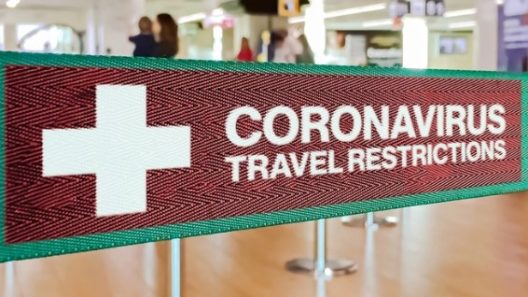What place should COVID-19 vaccine passports have in society?
Findings from a rapid expert deliberation to consider the risks and benefits of the potential roll-out of digital vaccine passports
17 February 2021
Reading time: 7 minutes

As part of the work the Ada Lovelace Institute is doing to explore the evidence, risks and benefits of public and private sector vaccine passports and COVID status apps, we have convened a group of experts to rapidly deliberate their roll-out.
This review summarises the findings and recommendations of the group, chaired by Professor Sir Jonathan Montgomery, and made up of multidisciplinary experts from the fields of immunology, epidemiology, sociology, international development, behavioural science, law, medical history, public health, ethics and technical system design.
The group, meeting across two weeks in January and February 2021, considered the risks and benefits of the potential roll-out of digital vaccine certification schemes, and discussed the evidence, deliberated on use cases, explored opportunities and risks, and identified areas of consensus to support government decision makers around the world.
The expert deliberation found that:
- At present, vaccination status does not offer clear or conclusive evidence about any individual’s risk to others via transmission, so cannot be a robust basis for risk-based decision making, and therefore any roll-out of a digital passport is not currently justified.
- However, given that evidence on transmission will emerge, and other countries and companies are developing such systems, the UK Government must act urgently to address the public policy issues that arise, and create clear and specific guidelines and law around any appropriate uses, mechanisms for enforcement and methods of legal redress.
- While vaccine passports will be seen by some as a way to increase freedom, for those without a passport they would constitute a denial of liberties that others are being granted. Therefore the justifications both for the relaxation of current restrictions for some and also for their continuation for others should be clearly articulated.
- The Government will need to take a clear position outlining the specific purposes and use cases for which, if any, vaccine passports can be legally and legitimately used.
In allowing some uses or actively facilitating vaccine passport apps, governments must address the issues and risks arising from such schemes or the creation of related digital infrastructure, and whether and how these risks could be mitigated.
The report recommends that the UK Government:
- Set scientific pre-conditions based on vaccine efficacy and transmission, durability and generalisability.
- Identify the urgent use cases, such as for frontline workers and employment in general so that the benefits and risks can be assessed if the scientific pre-conditions are met.
- Offer urgent clarification on the current legal status of the development and use of vaccine passports, in particular with regard to data protection, equality and discrimination, health and safety and employment law.
- Consult a wide group of experts and perspectives including those likely to be involved in the practical implementation of any use case. This understanding is a necessary condition for both policy development and effective public engagement.
- Engage publics on any potential uses to understand impacts, build trust and legitimacy, and understand what trade-offs the public is willing to make, particularly engaging with those groups who are likely to face disadvantage, discrimination or unique risks through the roll out of such technologies.
- Work through the World Health Organisation on international travel use cases.
This report is an interim summary of the findings and recommendations from the Ada Lovelace Institute expert deliberation, chaired by Professor Sir Jonathan Montgomery.
A fuller report of the deliberation session will be available next month.
We are indebted to the contributions of the experts who participated in this deliberation.
This report highlights conclusions from that collective conversation, acknowledging that
the group did not always arrive at a consensus, and the document reflects a majority view.
Individual findings have not been, and should not be, attributed to any specific individual.
Members of the expert group included:
Jonathan Montgomery (chair) is Professor of Health Care Law at University College London and Chair of Oxford University Hospitals NHSFT. He was previously Chair of the Nuffield Council on Bioethics and Chair of the Health Research Authority.
Danny Altmann is Professor of Immunology at Imperial College London, where he heads a lab at the Hammersmith Hospital Campus. He was previously Editor-in-Chief of the British Society for Immunology’s ‘Immunology’ journal and is an Associate Editor at ‘Vaccine’ and at ‘Frontiers in Immunology.’
Dave Archard is Emeritus Professor of Philosophy at Queen’s University Belfast. He is also Chair of the Nuffield Council on Bioethics, a member of the Clinical Ethics Committee at Great Ormond Street Hospital and Honorary Vice-President of the Society for Applied Philosophy.
Ana Beduschi is an Associate Professor of Law at Exeter University. She currently leads the UKRI ESRC-funded project on COVID-19: Human Rights Implications of Digital Certificates for Health Status Verification.
Sanjoy Bhattacharya is Professor in the History of Medicine, Director of the Centre for Global Health Histories and Director of the WHO Collaborating Centre for Global Health Histories at the University of York.
Sarah Chan is a Chancellor’s Fellow and Reader in Bioethics at the Usher Institute, University of Edinburgh. She is also Deputy Director of the Mason Institute for Medicine, Life Sciences and Law, a Associate Director of the Centre for Biomedicine, Self and Society and a member of the Genomics England Ethics Advisory Committee.
Tracey Chantler is Assistant Professor of Public Health Evaluation & Medical Anthropology at the London School of Hygiene and Tropical Medicine. She is also a member of the Immunisation Health Protection Research Unit, a collaborative research group involving Public Health England and LSHTM.
Robert Dingwall is Professor of Sociology at Nottingham Trent University. He is also a Fellow of the Academy of Social Sciences and a member of the Faculty of Public Health. He sits on several government advisory committees, including NERVTAG (New and Emerging Respiratory Virus Threats Advisory Group) and the JCVI (Joint Committee on Vaccination and Immunisation) sub-committee on Covid-19.
Amy Fairchild is Dean and Professor at the College of Public Health, Ohio State University. She is also Co-Director of the World Health Organization Collaborating Center for Bioethics at Columbia’s Center for the History and Ethics of Public Health.
Matteo Galizzi is Associate Professor of Behavioural Science at the London School of Economics. He is also Co-Director of LSE Behavioural Lab and coordinates the Behavioural Experiments in Health Network and the Data Linking Initiative in Behavioural Science.
Michael Parker is Director of the Wellcome Centre for Ethics and Humanities and Director of the Ethox Centre at the University of Oxford. He is also a member of the government’s Scientific Advisory Group for Emergencies, the Chair of the Genomics England Ethics Advisory Committee and a non-executive director of Genomics England.
Sobia Raza is a Senior Fellow at the Health Foundation within the Data Analytics team. She is also an Associate and previous Head of Science at the PHG Foundation.
Peter Taylor is Director of Research at the Institute of Development Studies. He was previously the Director of Strategic Development at the International Development Research Centre.
Carmela Troncoso is Assistant Professor, Security and Privacy Engineering Lab at the École Polytechnique Fédérale de Lausanne. She was a leading researcher on DP-3T and is also a member of the Swiss National COVID-19 Science Task Force’s expert group on Digital Epidemiology.
Edgar Whitley is Associate Professor of Information Systems at the London School of Economics. He is co-chair of the UK Cabinet Office Privacy and Consumer Advisory Group and was the research coordinator of the LSE Identity Project on the UK’s proposals to introduce biometric identity cards.
James Wilson is Professor of Philosophy and Co-Director of the Health Humanities Centre at University College London. He is also an Associate editor of Public Health Ethics and Member of the National Data Guardian’s Panel and Steering Group.
Our preferred citation for this report is:
Ada Lovelace Institute (2021). ‘What place should COVID-19 vaccine passports have in society? Findings from a rapid expert deliberation chaired by Professor Sir Jonathan Montgomery.’ [online] Ada Lovelace Institute. Available at: https://www.adalovelaceinstitute.org/summary/covid-19-vaccine-passports/
Image credit: Thutell
Related content

International monitor: vaccine passports and COVID-19 status apps
A tracker collating developments in policy and practices around vaccine certification and COVID-19 status apps as they emerge around the world.

The ethical implications of vaccine passports and COVID-19 status apps
The third in a series of public evidence events on vaccine passports and COVID status apps.

Governments must offer clarity on vaccine passports
Why it's essential to explore the evidence, risks and benefits of vaccine passports and COVID status apps before any potential roll out

Vaccine passports and COVID-19 status apps: launching an evidence review and expert deliberation
An evidence review and expert deliberation chaired by Professor Sir Jonathan Montgomery